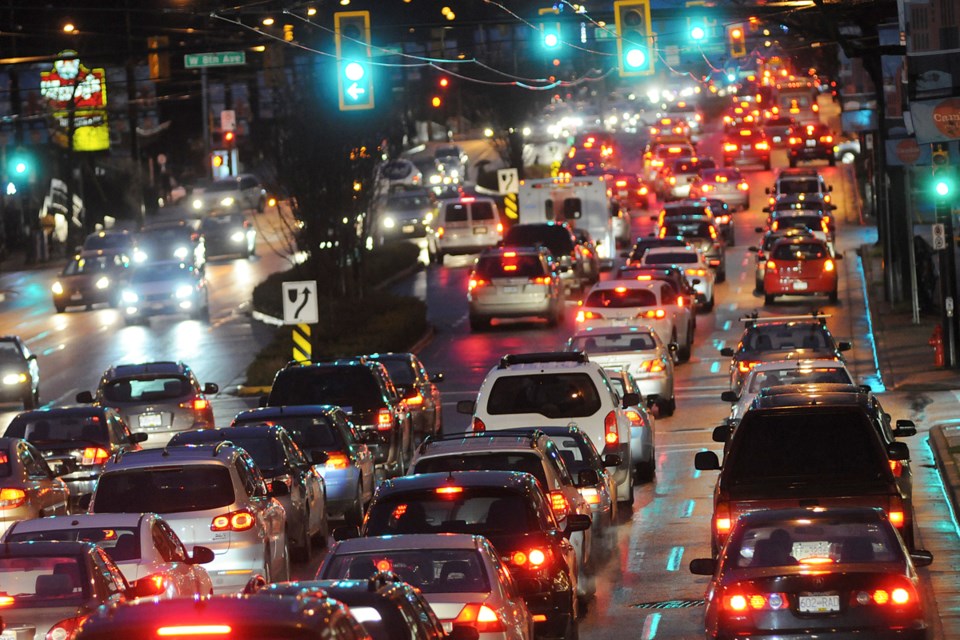The region's mayors launched a campaign April 5 at a Surrey SkyTrain station that calls on political parties running candidates in next month's provincial election to endorse and fund the municipal leaders' 10-year transit and transportation plan.
The "cure congestion" campaign is aimed at having the political party that wins the May 9 election commit to help pay for major projects and upgrades, as well as introduce legislative changes to allow municipalities to raise money to complete the $7.5-billion plan.
"We've heard loud and clear from residents across our region that they have had enough of congestion, whether it's traffic on our roads and bridges, or it's people packed into our transit system," Mayor Gregor Robertson told reporters at the King George SkyTrain station during the Wednesday morning rush hour.
The mayors' plan calls for a subway along the Broadway corridor, a light-rail system in Surrey, a new Pattullo Bridge, more buses and SkyTrain cars, improved HandyDart service and upgrades to transit stations.
The provincial government committed $246 million for the first phase of the plan and last week matched the federal government's $2.2 billion for the second phase.
The mayors want more money from the provincial government but were unable Wednesday to provide a total dollar amount, although New Westminster Mayor Jonathan Cote said SkyTrain upgrades and improvements to transit service totals about $350 million. More money is also needed beyond the one-third commitment from Premier Christy Clark's government for the $1-billion replacement of the Pattullo Bridge, he said.
"We expect tolls to cover just over half the cost of that structure, but we still need the other component to fill in there," said Cote, whose residents rely heavily on the existing span that connects New Westminster to Surrey.
Surrey Mayor Linda Hepner praised the provincial and federal governments for recently agreeing to each fund $2.2 billion of the cost for major projects in the plan, including a subway along the Broadway corridor and a light-rail system in Surrey.
"But today's all about what's in the rest of the plan, and what else do we need — and we need that help for Pattullo, we need that help to improve some of the stations," she said, noting the King George station needs upgrades.
HandyDart service also has to be improved and more SkyTrain cars are required to meet ridership, said Hepner, who was also pressed by reporters for the mayors' total funding request of the provincial government.
"What we're looking for is for all the [political] parties to endorse the whole vision that the mayors have come up with, and to be prepared to work as partners in executing that vision — whether or not today we have those exact numbers for you," she said.
Under the three-way funding formula to pay for the second phase of the plan, the mayors still have to determine how it will raise money for 20 per cent of the work that needs to be done.
Property taxes and fare hikes were approved to help pay for the first phase. Tolls and road pricing have been among the suggestions for the second phase.
But Robertson said Wednesday that municipalities could raise a majority of the 20 per cent by charging developers a fee for any developments built around transit stations.
That funding source requires approval from the provincial government, which has met recently with developers, local government representatives and university academics to discuss the funding scheme and building more housing in and around transit corridors.
The government hasn't made any commitments to require developers pay for an additional fee — on top of existing fees already charged for projects — but Peter Fassbender, the minister responsible for TransLink, told the Courier by telephone Wednesday that it is an option.
"[The mayors] had clearly put that ask on the table a number of months ago," Fassbender said. "We have been talking about this issue and how it can help on a number of fronts. So we actually were ahead of the mayors when it came to suggesting that increased density and supply would help the region, both in terms of affordability but also the opportunity to help fund transit. We have clearly said we believe it is an opportunity that should not be missed."
Asked whether his government is committed to contributing more money to the mayors' 10-year plan, Fassbender pointed out the $246-million funding for the first phase and $2.2 billion for the second phase.
"So I would simply say we've made significant commitments with real dollars on the table, and I am absolutely committing that we will continue to work with them, should the people of B.C. re-elect us as government," the minister said.
Fassbender wouldn't comment on whether the province will require another plebiscite to gauge whether British Columbians want to pay for more transit and transportation improvements.
As for how much more the provincial government will spend on the mayors' plan, Fassbender said he nor the mayors could provide a specific dollar figure because the cost and details of projects are still under discussion.
"We have experts in the ministry and in TransLink and the local governments working on that due diligence," he said. "So until that work is done, we don't know what the final costs are going to be. Until that happens, it's pretty hard to comment."



